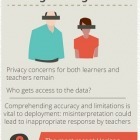This was written by Phil McRae who is an executive staff officer with the Alberta Teachers` Association. Dr. Phil McRae’s Biography, Research, Writing, Scholarship and Presentations can be found at www.philmcrae.com, and you can follow him on Twitter here.
Get Started for FREE
Sign up with Facebook Sign up with X
I don't have a Facebook or a X account
 Your new post is loading... Your new post is loading...
 Your new post is loading... Your new post is loading...

Peter B. Sloep's curator insight,
January 3, 2013 9:11 AM
And so Crispin Weston goes on to attack MOOCs, Learning Analytics and Open Educational Resources. After discussing each bubble, including why it is destined to pop, he discusses the question of what is needed to make the innovation that each bubble foreshadows, last.
Weston makes several sensible observations, such as "an academic education is not equivalent to a trip to the public library, digital or otherwise", or learning "analytics is predicated on 'big data' but in education, big data will not exist until we sort out the current failure of interoperability", or with Open Education Resources "the quality of the resources themselves and the pedagogies they represent are poor." However, these observations lead to incoherent arguments, in the case of Learning Analytics to downright insinuating ones. His arguments do not attempt to represent the complexity of the situation that surrounds each of these educational innovations. Rather they serve one purpose, portraying the innovation as a bubble.
Weston's arguments lack subtlety to the degree that there seems to be an agenda underlying them, and indeed there is one. It is that research should be taken out of the hands of academics and public funding bodies to make place for "proper R&D that is commercially-funded and responds to market requirements." There is of course nothing wrong with companies getting involved in R&D. Indeed, in EU framework projects always commercial parties participate in the research consortia that are set up. But it is too simplistic to portray research done by companies as proper and all the rest as improper.
With Weston I have my doubt and worries about MOOCs, Learning Analytics and OERs. They have bubble-like qualities in that researchers and educational administrators seem too uncritically adopt them. Uncritically adopting technological innovations in education actually happens quite often. And industry has more than once played a dubious role in this, see what Todd Oppenheimer in his Flickering Mind writes about the money that was wasted on the introduction of computers in K-12 education. The conclusion should be that a discussion about innovations such as MOOCs, Learning Analytics, Open Educational Resources, e-Portfolios, Serious Games, Adaptive Learning systems should never be guided by political agendas such as boosting commercial research. There is enough to worry about as it is. What really gets me worried is the idea that the venture capitalists that fund the MOOCs are going to determine the destiny of Higher Education; precisely because they think commercially and respond to market requirements only. |

Gust MEES's curator insight,
January 20, 2013 11:00 AM
A MUST know for any person in the Education field!!!

davidgibson's curator insight,
March 6, 2013 9:18 AM
Gotta love these visuals...read with a critical eye and find if it misses a mark you wish could be added to the picture. 
David Mooers's comment,
April 12, 2013 2:52 AM
I see a great potential for students to delve deeper into a particular field of interest captivating and encouraging specialization unleashing the limitations of standardized teaching
|









![Learning Analytics: Leveraging Education Data [Infographic] | gpmt | Scoop.it](https://img.scoop.it/yYMapZLMT6NQAyml4UpvxTl72eJkfbmt4t8yenImKBVvK0kTmF0xjctABnaLJIm9)





